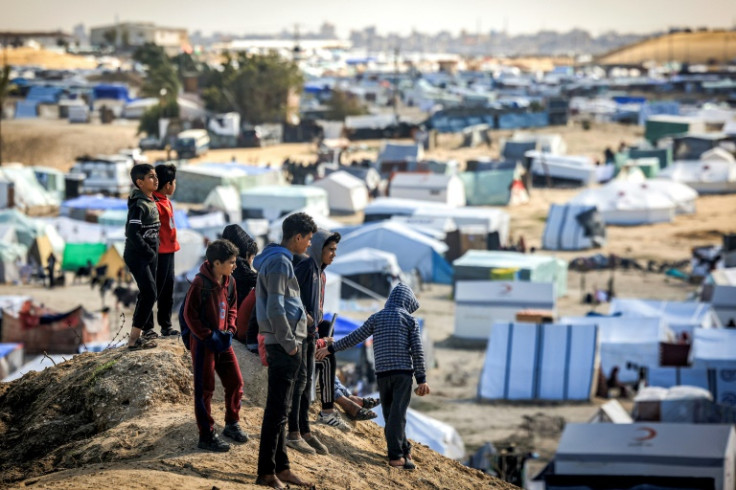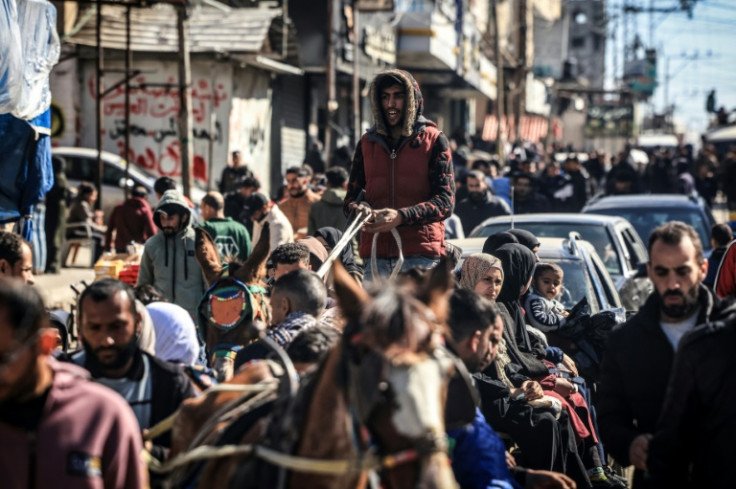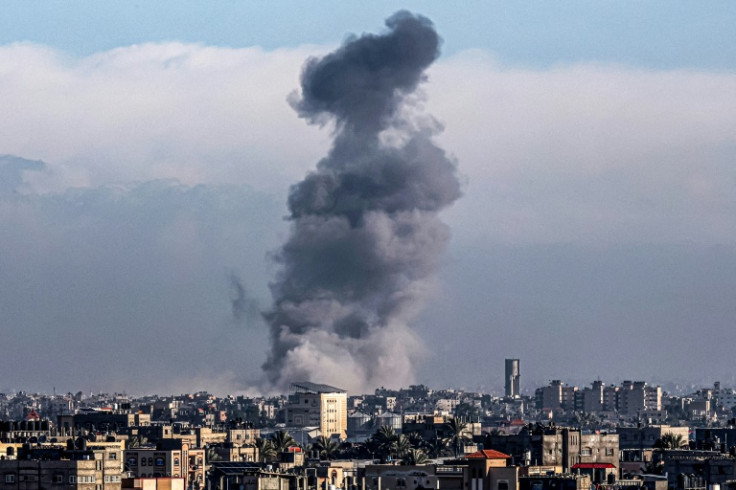
Tens
of thousands of people crammed into a street in Rafah, the southern Gaza city where vast numbers have sought refuge from advancing Israeli ground troops.
"These are the worst months of our lives," said Noha al-Madhun, who fled from the Beit Lahia area of northern Gaza and was taken in by relatives along with some of her children.
"My husband and eldest sons sleep in a tent. There's no space for everyone. We sleep on the floor and we feel the cold" without enough blankets to go round, she said.
"There aren't enough apartments or even places to set up extra tents," added Madhun.
More than half of Gaza's population of 2.4 million is in Rafah, on the border with Egypt, according to the United Nations.
Those without relatives to host them or the means to rent apartments have found themselves in tents wherever there is space: along streets, in public squares, sports stadiums or parks.
Abdulkarim Misbah, 32, said he left his home in the northern Jabalia refugee camp and reached Khan Yunis, only to be uprooted once more.
"We escaped last week from death in Khan Yunis, without bringing anything with us. We didn't find a place to stay. We slept on the streets the first two nights. The women and children slept in a mosque," he said.
Then they received a donated tent, setting it up right beside the Egyptian border.
"My four children are shivering from the cold. They feel sick and unwell all the time," said Misbah.
Most people are concentrated in the city centre or west, trying to avoid the eastern edges towards the Israeli border or the north which is dangerously close to fighting in nearby Khan Yunis.
After the war erupted on October 7 with Hamas militants' unprecedented attack on Israel, the country's military ordered Gazans to leave their homes in the north.
Those instructions have since expanded, forcing many Palestinians to flee time and again.
Gaza City resident Amjad Abdel Aal, who fled to a school shelter in Rafah, said it took her two hours to be driven a distance which before the war would take just 15 minutes.
"The congestion was awful," she said, waiting in a wheelchair in a long line for donations of blankets and mattresses.
"There aren't a lot of cars because of the fuel shortage. Everyone walks, rides a truck or donkey cart," added the barefoot 28-year-old.
The United Nations estimates 1.7 million have been forced from their homes by the war since October 7.
The Hamas attack on Israel resulted in the deaths of around 1,160 people, mostly civilians, according to an AFP tally based on official figures.
Israel's withering offensive has killed at least 27,131 people in Gaza, mostly women and children, according to the health ministry in the Hamas-run territory.
With Egypt's border firmly shut to most Gazans throughout the war, the streets of Rafah have become packed with displaced people.
Mehran Dabbabish, 41, a taxi driver from Khan Yunis, said the situation was "getting worse by the day".
"The road between Khan Yunis and Rafah used to take 20 to 30 minutes at worst. Today, the shortest trip within Rafah takes an hour and a half to two hours," he told AFP.
The overcrowding is putting a massive strain on everyone and means moving anywhere, by any means, is incredibly difficult.
Another Gazan, Naima al-Bayumi, lamented how tired she was just halfway through a four-hour journey by foot to visit her relative in hospital.
"I rode a donkey cart a few times and fell off because of the intense scramble," she told AFP.
Bayumi started crying as she recounted the bombardment which hit her home, killing her baby twins.
"I gave birth to them in the first week of the war, after 13 years of marriage," said the 38-year-old, who lives in a tent with her husband.
"I don't want to live anymore," she said.
Elsewhere on the road, people helped another woman clamber aboard a truck filled with dozens of passengers.
She clung to the side of the truck with her baby, to stop them falling out, and screamed: "Death is more merciful than this life!"









